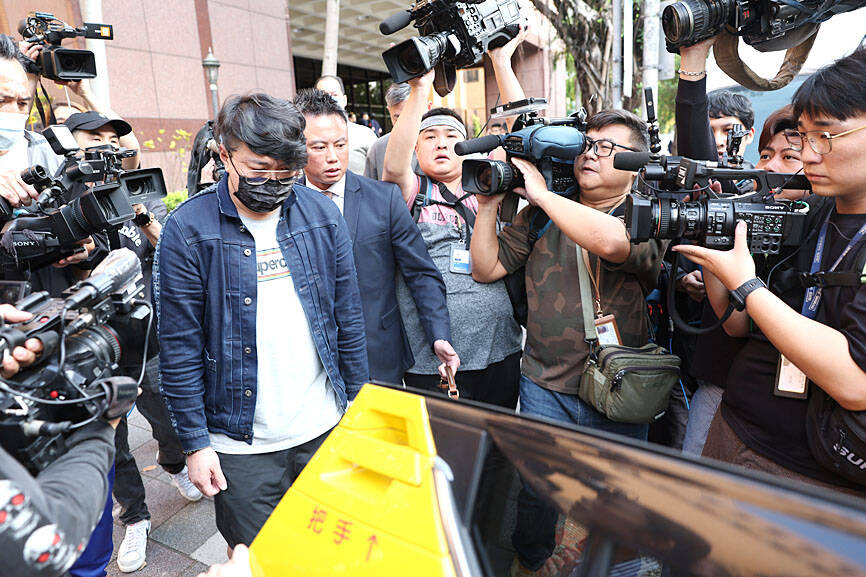Prosecutors yesterday questioned people over an apparent food poisoning incident at a Polam Kopitiam (寶林茶室) restaurant and listed three as suspects.
Franchise owner Li Fang-hsuan (黎仿軒), a store manager surnamed Wang (王) and a Vietnamese cook surnamed Ho (胡) face charges of contravening the Act Governing Food Safety and Sanitation (食品安全衛生管理法) and negligence causing death, prosecutors said, adding that they have been barred from leaving the country.
Two people have died after eating on separate days last week at the restaurant in Taipei’s Far Eastern Department Store Xinyi A13.

Photo: CNA
The results of an autopsy on one of those who died, a 66-year-old man, were released yesterday. They showed that bongkrek acid was in blood samples, as was the case for the first person who died, a 39-year-old man.
Health officials said it is the first time the toxin has been linked to deaths in Taiwan.
Others who fell ill after eating at the restaurant reported symptoms including abdominal pain, nausea, vomiting and diarrhea.
Health authorities yesterday said that 21 people have been identified as having symptoms after eating at the restaurant last week, with five in intensive care units.
Prosecutors earlier questioned the suspects about food handling and preparation procedures.
Prior to the autopsies showing the presence of bongkrek acid, prosecutors had included deliberate poisoning and bacterial contamination as possible causes.
Ho told prosecutors that he was a substitute for a regular chef, surnamed Chou (周), who had gone abroad on vacation.
Ho had been in charge of the kitchen for nine days until the Taipei City Government on Tuesday ordered all of the restaurants in the franchise to close until further notice, meaning he was there prior to Tuesday last week.
The 66-year-old ate there on that day. He died on Wednesday.
Ho told prosecutors that he followed proper procedures for preparing food and cooking dishes, and added that Li and Wang were in charge of ordering and storing ingredients.
Prosecutors also questioned Chou, who returned to Taiwan yesterday.
The Taipei Department of Health fined Li NT$2.5 million (US$78,149) for supplying false information on the restaurant’s business registration.
Moreover, Li has not paid mandatory product liability insurance since last year, the department said.
Most of those who reported symptoms after eating at the restaurant last week said they ate char kway teow (炒粿條) from the menu — a stir-fried rice noodle dish.
Experts suspect the bongkrek acid was in the noodles and officials have inspected suppliers to determine the source of the toxin, including whether it originated overseas.
Li had promoted the franchise as authentic Malaysian cuisine and said most of the ingredients were imported from Malaysia.

Right-wing political scientist Laura Fernandez on Sunday won Costa Rica’s presidential election by a landslide, after promising to crack down on rising violence linked to the cocaine trade. Fernandez’s nearest rival, economist Alvaro Ramos, conceded defeat as results showed the ruling party far exceeding the threshold of 40 percent needed to avoid a runoff. With 94 percent of polling stations counted, the political heir of outgoing Costa Rican President Rodrigo Chaves had captured 48.3 percent of the vote compared with Ramos’ 33.4 percent, the Supreme Electoral Tribunal said. As soon as the first results were announced, members of Fernandez’s Sovereign People’s Party

MORE RESPONSIBILITY: Draftees would be expected to fight alongside professional soldiers, likely requiring the transformation of some training brigades into combat units The armed forces are to start incorporating new conscripts into combined arms brigades this year to enhance combat readiness, the Executive Yuan’s latest policy report said. The new policy would affect Taiwanese men entering the military for their compulsory service, which was extended to one year under reforms by then-president Tsai Ing-wen (蔡英文) in 2022. The conscripts would be trained to operate machine guns, uncrewed aerial vehicles, anti-tank guided missile launchers and Stinger air defense systems, the report said, adding that the basic training would be lengthened to eight weeks. After basic training, conscripts would be sorted into infantry battalions that would take

GROWING AMBITIONS: The scale and tempo of the operations show that the Strait has become the core theater for China to expand its security interests, the report said Chinese military aircraft incursions around Taiwan have surged nearly 15-fold over the past five years, according to a report released yesterday by the Democratic Progressive Party’s (DPP) Department of China Affairs. Sorties in the Taiwan Strait were previously irregular, totaling 380 in 2020, but have since evolved into routine operations, the report showed. “This demonstrates that the Taiwan Strait has become both the starting point and testing ground for Beijing’s expansionist ambitions,” it said. Driven by military expansionism, China is systematically pursuing actions aimed at altering the regional “status quo,” the department said, adding that Taiwan represents the most critical link in China’s

‘REALLY PROUD’: Nvidia would not be possible without Taiwan, Huang said, adding that TSMC would be increasing its capacity by 100 percent Nvidia Corp CEO Jensen Huang (黃仁勳) on Saturday praised and lightly cajoled his major Taiwanese suppliers to produce more to help power strong demand for artificial intelligence (AI), capping a visit to the country of his birth, where he has been mobbed by adoring fans at every step. Speaking at an impromptu press conference in the rain outside a Taipei restaurant, where he had hosted suppliers for a “trillion-dollar dinner,” named after the market capitalization of those firms attending, Huang said this would be another good year for business. “TSMC needs to work very hard this year because I need a lot